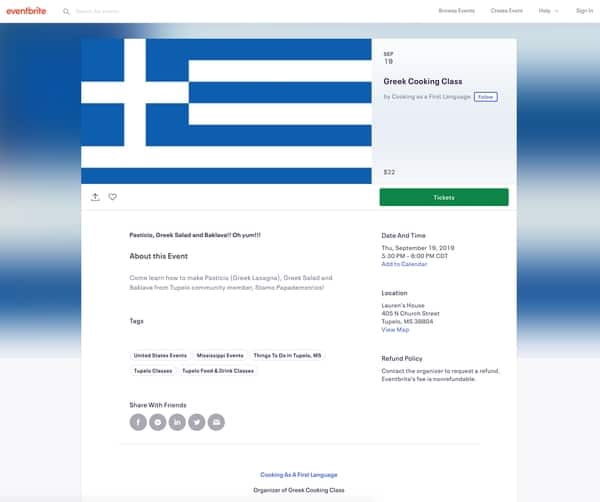 Written by Jason Logsdon
Written by Jason Logsdon
How to Teach Cooking Classes of Your Own with Lauren McElwain
Click to discover how to serve your Fans and grow your incomeTeaching cooking classes is a great way for food bloggers to get involved with their fans.
One of the things that works really well with food bloggers is teaching cooking classes. We already know how to teach, we write recipes so people can learn how to cook the types of food that we're cooking. And using our expertise hands on, to share it with people is a great way to make some extra money, to grow your brand and to meet some interesting people in your community.
A lot of people don't know how to get started doing that though. And they get nervous about what types of things they should be doing.
In a recent podcast interview I talked to Lauren McElwain, director of Cooking as a First Language, which is all about bringing communities together by teaching cooking classes.
Because of this she's taught a lot of cooking classes and she's worked with a lot of people teaching classes for the first time. I picked her brain about some tips and tricks that you can use when you go out there to start teaching cooking classes of your own.
Listen to or Watch the Interview
This episode from the Makin' Bacon Podcast podcast is available on all your favorite podcast platforms including Apple Podcasts, Spotify, Stitcher, Overcast, and Google Podcasts.
The video of the interview is also available on the Makin' Bacon YouTube Channel.
Here Is What Lauren and I Had to Say:
Jason Logsdon: This is something Lauren, you said you had a blog, you weren't making much money with it but you enjoyed it as a hobby, and then you found this other outlet.
I think teaching cooking classes is something a lot of food bloggers can do since we already transmit information. So if food bloggers out there were interested in teaching classes in their local area, what type of tips or advice would you have for someone starting to explore this.
On Scheduling Classes

Lauren McElwain: One thing that's made our life a lot easier with these cooking classes is going on to Eventbrite. If you're going to spend a lot of time planning this class, buying ingredients, and making preparations for it, the last thing you want is for 8 people to sign up and then the day of the event, 7 people can't make it, sorry.
Even if you're just starting out, make an event on Eventbrite, figure out what price per person is best for you and then send that link to anyone who is interested in coming. If people go ahead and pay for it, they're already more invested in it and less likely to cancel last minute. It's something that's made our life so much easier.
Jason: Eventbrite collects the money. Do you pay them as well or is there a fee per ticket?
Lauren: There's a little fee like $2 or $3 charge per person, but we just add it into the price of the ticket. It's not a big deal. Eventbrite is hooked up to your bank account and you directly get the payout.
On Interactive Classes

Lauren: Another good tip for a cooking class which takes pressure off of you so you're not the only one talking and doing something, is to make the class interactive.
It is always a good idea to have lots of cutting boards. Once you have people at work on a cutting board, they're going to start talking among themselves. It automatically breaks the ice and the environment becomes much more laid-back, nobody is stressing.
One of our catch phrases at Cooking as a First Language is "Where there's a cutting board, there's community".
Sure, you have some great tips to share with people and there will be time for that and time for those demos. But it's important to make the atmosphere as laid-back and relaxed as possible by giving everybody who comes a job at some point.
Jason: I've taken a lot of different cooking classes and I find at the hands-on ones you feel like you have more ownership and buy-in of what's going on. You're more engaged.

Lauren: It makes such a great date night because not only do you have a meal, but you also have an activity. Instead of dinner and a movie, you've have cooking together and dinner. It's like a two in one, an activity and a meal.
On Length of Classes
Jason: How long do most of your classes last?
Lauren: We try to keep them right at 2 hours. And that was something we had to live and learn to figure out. At one of the Bangladeshi classes, we didn't think about the rice taking a long time to cook. So there was some down time with people waiting around for the rice to get done.
So now we know! When somebody's coming in to teach a class, we just say to them "If there is a step that takes a long time, please prepare ahead of time enough for everybody who's going to be here. And then just bring a small amount of ingredients to do a small demo just to show them how to do it." Just like on a cooking show, the people start talking and then magically the food is all done in a few minutes.
Jason: I've definitely thought about that since I've been thinking about teaching some more cooking classes and I focus on sous vide. Obviously you don't want to have a 72-hour class to show how to make a "72-hour short rib recipe". You need to get around that so I've been looking at different ways.
On Pricing Classes
What do you normally charge for your classes?
Lauren: We try to keep the price very approachable because we're all about breaking down barriers between people and building up community. We want most people to be able to participate so we keep the price at $22. We're not trying to make money off people who are coming to these classes. We just want to be able to reimburse the person who is giving us their time to come in and teach.
Jason: That's awesome. It's quite reasonably priced for a cooking class, actually it's inexpensive for 2 hours of anything.
Lauren: It's an activity and a meal, a really cheap date night men!
Jason: In New York, I can't get a meal for $22, much less instructions on something.
On Avoiding "Gotchas" in Classes
Jason: Since you've seen a lot of people who aren't experienced teachers now teaching classes, what are some of the gotchas you've seen that people might run into if they haven't been teaching classes before, that food bloggers should be aware of if they decide to teach a class.

Lauren: I think having the larger amount prepared in advance and then doing the smaller amounts for a demo. It's kind of an "aha" moment that not only I've had, but some of the guest teachers have commented on it making things so much easier. I'm going to prepare the large batch beforehand and then I'll just do this smaller demo that makes life so much easier.
Jason: I wouldn't have thought of it but I can just picture someone going, well now we're going to peel 40 shrimp. Yeah, the guests would be thinking that we don't need to watch this, show us 2 and then we can move on.
Lauren: Some people are really bad at giving up control, they don't want to delegate the task because they know what they're doing. And I totally get it, that's totally fine. Some people want to do everything, so just encourage them to let some of the class attendees have a job, it always gives a good result.
You can listen to the full interview on the Makin' Bacon: Lauren McElwain Cooking Classes and Community Building or watch it and other interviews on the Makin' Bacon YouTube Channel.
Parting Thoughts
Teaching cooking classes is just one service that you can offer to your fans to bring in some extra income. If you're interested in finding some more ways. You can check out this video How to Succeed with Products and Services. It goes into a lot more depth about many of the options you have for creating products and services that can deliver massive value to your fans.
Some more information about cooking classes:
- The Makin' Bacon How to Create Cooking Courses hub
- How to Deliver Cooking Courses to Your Fans
- How to Create a Cooking Course
What type of cooking classes are you interested in teaching? Let me know in the Makin Bacon Facebook Group or the comments below.
 Hi, I'm Jason Logsdon! I'm an adventurous home cook and the head writer and photographer for Amazing Food Made Easy. I grew my income to 6-figures by focusing on serving my Fans by providing massive value, and I want to help you do the same.
Hi, I'm Jason Logsdon! I'm an adventurous home cook and the head writer and photographer for Amazing Food Made Easy. I grew my income to 6-figures by focusing on serving my Fans by providing massive value, and I want to help you do the same.














